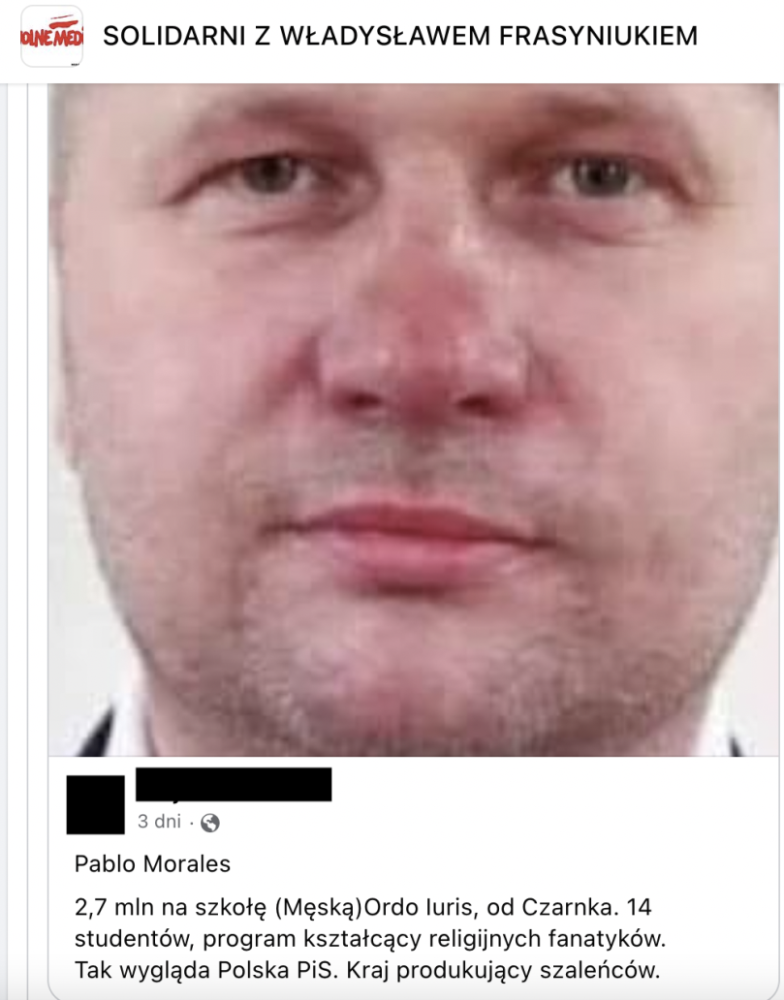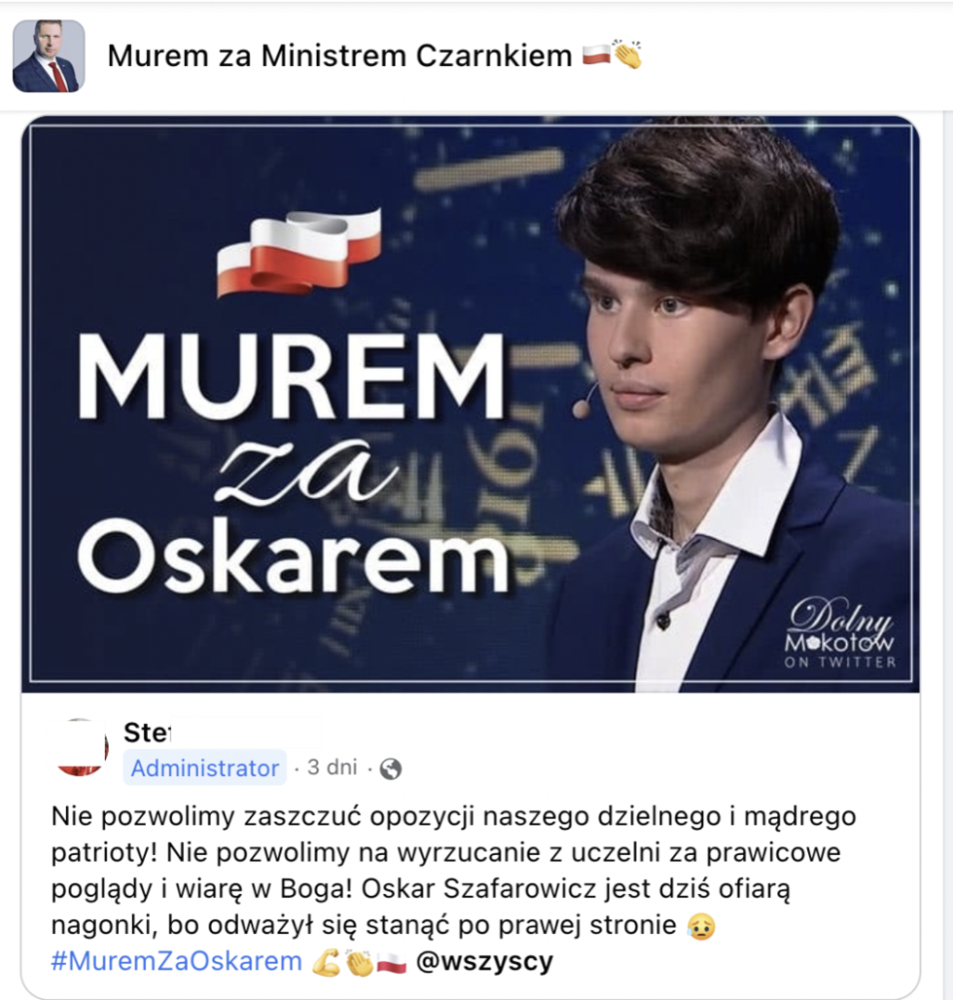
Group polarization
We frequently hear about the irrational behaviour of people acting in a group at a party or at school. When confronted with the consequences of their own behaviour, people claim that individually they would never behave aggressively or so radically. It is true that more extreme decisions are taken by groups, and this phenomenon is related, among other things, to the existence of rivalry within groups. Group reactions are stronger than the individual reactions of each member of the group. Furthermore, group discussions lead to a reinforcement of the validity of the attitudes and values held, and the narratives often become more extreme towards the end of the discussion.
The example below illustrates how, in a highly polarized society, instead of discussion, individuals indulge only in insults and name-calling. The photo of the former Polish prime minister and opposition leader suggests that Donald Tusk is inconsistent in what he says or even lies. A stream of insulting comments appeared under his photo, comparing him to a dog and even encouraging people to spit at him. Mention was also made of the well-known Polish independent TVN and TVN24 network, which could lose its broadcasting licenses as a result of legislative proposals by the ruling Law and Justice party to ban non-European ownership of Polish media. One of the network’s slogans was used mockingly in the post: "Truth all day long." Use of the slogan in this context extends polarization over the media by suggesting that US-owned broadcasters lie, just like Donald Tusk, and are therefore not worth watching.

Another Facebook group featured the photograph (below) of the current Minister of Education and Science. Since this group does not sympathize with those in power, the comment under the photo mocks the minister's appearance as the "face" of the ruling party, but also ridicules religious people who support the government and refers to them as "lunatics." As one may see in these examples, polarization results in one group denigrating the other group and using personal criticism and abuse that is irrelevant to the real debate. This creates a vicious cycle of endless name-calling.

The caption says: “[This is] Pablo Morales. 2.7 million for Ordo Iuris (male) school, from [Minister] Czarnek. 14 students, a program to educate religious fanatics. This is what the Poland of the Law and Justice [party] looks like. A country that produces lunatics.”
What becomes apparent in a group is how we compare ourselves with others. When we compare ourselves "upward," we make a comparison with people who are more competent or knowledgeable than us, or recognize that they are more capable than us. This is conducive to higher aspirations and more motivation for change. On the other hand, polarization is based on comparing ourselves "downward", on the assumption that the others are somehow inferior, know less, have less awareness of reality, or "don't understand as well as we do." This is exemplified in the post above in which minister Czarnek's photo comes from a Facebook group called “In Solidarity with Władysław Frasyniuk” opposed to the PiS party government. In another Facebook group, Sympathizers of the Coalition of Defenders of Democracy (a social movement also opposed to the policies of those in power), a post appeared referring to number zero. The term "zero" has emerged in the polarized political debate in Poland over the Minister of Justice, whose reforms of the judiciary have incurred fines imposed by the CJEU of one million euros a day. Rather than a substantive exchange of arguments, the minister's opponents allude to the minister's lack of intelligence and use a play on words in the post aimed at demeaning him. From a psychological perspective, "downward" comparisons make us feel good about ourselves and flatter our egos. As members of a group, we are more likely to mock the "others" and attribute traits to them that, when social polarization is rampant, can be dehumanizing and invoke hate speech. Have you witnessed such a spiral of hatred and progressive polarization based on beliefs and emotions in your favorite groups?
The Facebook bubble
Social media seeks to create communities that take up more of our time and thus become routine. In turn, a more frequent presence on social media means the opportunity for social platform owners to earn more money from advertising. Social media thereby provides support for sites where both interest-based and activism-based interaction occurs. Facebook builds its isolated communities by means of groups, some of which are formed and grow organically, while others are set up by specific organizations or politicians. Most of us do not take the trouble to check who the group administrator is. In the example below, the group known as In Solidarity with Minister Czarnek is administered by a young activist from the Law and Justice party. This group was created on the very first day when Minister Czarnek took office in 2020. He was under criticism from the opposition and numerous activists for his speeches discriminating against the LGBT+ community and his radical Catholic views in line with the ruling party.
 In Solidarity with Minister Czarnek Facebook group has more than 13,000 members and two administrators, one of whom is Oskar Szafarowicz, a young Law and Justice party activist.
In Solidarity with Minister Czarnek Facebook group has more than 13,000 members and two administrators, one of whom is Oskar Szafarowicz, a young Law and Justice party activist.
The position of group administrator gives you the authority to accept, write or block posts, thus controlling the narrative and general emotional tone. Members of such groups can be engaged in "opposing", "supporting", "defending" or "being in solidarity" with someone (one administrator may insert a post supporting another administrator, such as a politician). This is precisely what got the Law and Justice party activist and administrator himself into trouble. The other administrator inserted posts expressing solidarity with him in their own group.

The long caption accompanying a photo of one of the administrators states: In solidarity with Oskar. Below, the other administrator writes: “We will not allow the opposition to persecute our brave and wise patriot! We will not allow him to be expelled from university for his right-wing views and belief in God! Oskar Szafarowicz is today a victim of the smear campaign because he dared to stand on the right side!”
Groups declaring solidarity with individuals in their own group or sympathizing with parties and organizations may often consist of offensive and emotionally charged content. They are likewise responsive to all the hottest social and political topics and enclose the audience in biased and extreme narratives about opponents. Old emotional posts are often re-shared in a new context. An example of this is a post shared in a group called In Solidarity with Rafał Ziemkiewicz (a controversial right-wing political commentator). It contains a photo of MP Klaudia Jachira, previously known, among other things, for her satirical videos on social media. Together with a caption, a carefully selected frame from the video conveys the impression that she is scratching her head and eating lice found on it, while instead of the initials “MP” the caption consists of an offensive play on words is used to compare her with a donkey. This shared post dates from 2020 and was re-shared in the context of political disputes in 2023. It is an attempt to stir up revulsion against the MP herself as well as an attempt to vilify the opposition to the government.
Another example of provoking disgust and even dehumanizing the opposition is a meme that appeared in the Facebook group In Solidarity with Minister Czarnek. It depicts the smiling face of the mayor of Warsaw holding a large insect near his face. The meme is intended to arouse repugnance and to dehumanize not only the mayor, Rafał Trzaskowski, but also politicians of the Civic Platform opposition party. It also suggests that if the opposition comes to power, voters will have to eat insects, an allusion to a recent controversy in Poland over the rumor that the European Union is about to impose the consumption of protein-rich insects instead of non-organic animal meat. As a result, a narrative has emerged of a pro-EU opposition supporting culturally alien culinary habits.
One of the more polarizing narratives consists of comparing political opponents to Nazis. Once again in the group "In Solidarity with Minister Czarnek", a meme was shared in which one of the most frequently attacked opposition leaders Donald Tusk was depicted with an unnaturally crooked face and uttering words referring to Polish tradition, and the sanctity of bread and the eucharist. In the center of the meme there is a loaf of bread with a swastika drawn on it, equating Donald Tusk and his family with Nazi Germany. The message implies that the leader of the opposition party is also a religious hypocrite, which in a country that is predominantly Catholic is also regarded as anti-Polish.
As the name “social media” suggests, the intention is to bring people together. But it turns out that groups on social media also radicalize and reassure themselves of the validity of their views and values. Differences arise more often - especially when groups compare themselves "down" with "the other" or an enemy, considering them inferior to themselves. The group creates a closed environment which is mostly impervious to anything but one-sided opinions and biased information. Often the administrators of these groups control the message and act as a kind of filter for the information bubble that is thereby created. Polarization is also reflected in the very name of groups that advocate for or support a particular side. Furthermore, the language used in such groups is often intended to radically divide people by provoking, dehumanizing and ridiculing them. Nevertheless, polarization can be resisted and can be actively overcome, for example, by following the five simple steps outlined below.
Polarization can be overcome by:
● Taking care of one's own mental resilency to social media content liable to cause stress and emotional problems;
● Joining a group outside your own Internet bubble and monitoring its narratives from the position of an observer, and if you feel up to it, you can actively oppose hate speech, ridicule or polarization;
● Identifying the administrators of our favorite groups calling for action and discussion on current socio-political events; reveal this knowledge in the group discussions;
● Educating friends about how groups and social media work and about what language and communication (insulting, belittling, dehumanizing) should not be accepted from either side (including "one's own");
● Creating your own “procedures” to evaluate information.
💡 Are you interested in learning more about the ways to boost your media literacy and counter disinformation more effectively? Enroll in our free, self-paced course on Countering Disinformation today!
Background illustration: Photo by Andrii Yalanskyi from Adobe Stock license
